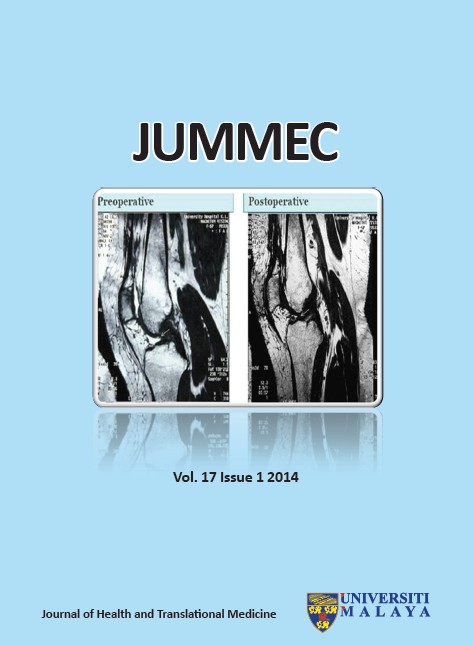AUTOLOGOUS CHONDROCYTE IMPLANTATION FOR KNEE FOCAL CARTILAGE DEFECTS: 3 YEARS’ FOLLOW-UP AT THE UNIVERSITY MALAYA MEDICAL CENTRE
Abstract
Autologous chondrocyte implantation (ACI) is a widely accepted procedure for the treatment of large, full-thickness chondral defects involving various joints, but its use in developing countries is limited because of high cost and failure rates due to limited resources and support systems. Five patients (age <45 years) with focal cartilage defects received ACI at University of Malaya from 2006 to 2007 and followed up for 36 months. The average presubjective Knee Evaluation Forms (IKDC) improved from 38.44'6.29 to 25.6'8.04 postoperatively, the Oxford Knee Score (OKS) went from 25.6'8.04 to 13.96'1.63 and the American Knee Society Score (AKSS) improved from 80'14.33 to 92.96'5.82 post-operatively. Thus improvements were seen in the IKDC and AKSS score but not in the OKS. Magnetic resonance images showed the presence of cartilage tissue filling in the lateral and medial patellar facet and medial femoral condyle in three patients. Failures were seen in two patients, both with patellar defects and over the age of 36 years. Treatment with autologous chondrocyte implantation for focal cartilage defect in lateral and medial patellar facet and medial femoral condyle showed early improvement which was maintained at 3 yrs follow-up. ACI provided satisfactory outcome in focal cartilage defects involving the femoral condyle.
Downloads
Downloads
Published
Issue
Section
License
All authors agree that the article, if editorially accepted for publication, shall be licensed under the Creative Commons Attribution License 4.0 to allow others to freely access, copy and use research provided the author is correctly attributed, unless otherwise stated. All articles are available online without charge or other barriers to access. However, anyone wishing to reproduce large quantities of an article (250+) should inform the publisher. Any opinion expressed in the articles are those of the authors and do not reflect that of the University of Malaya, 50603 Kuala Lumpur, Malaysia.


